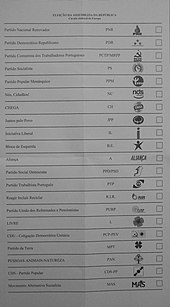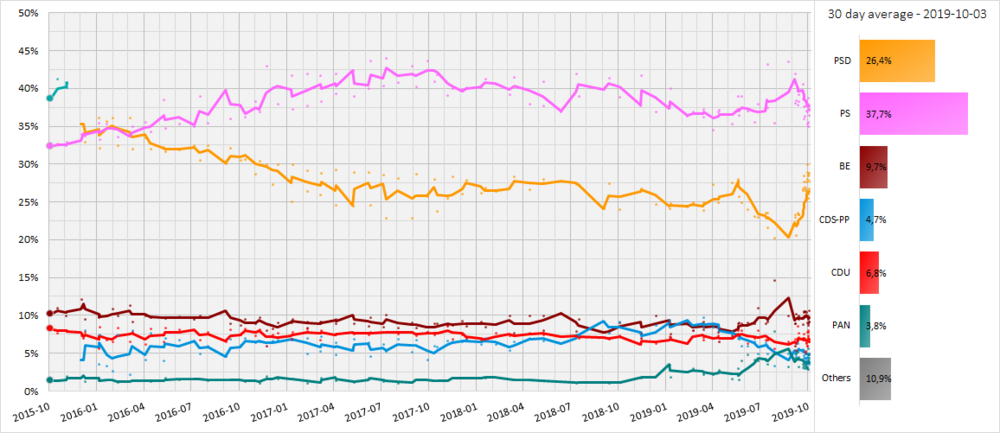General election in Portugal 2019
voter turnout 48.5%
In the parliamentary elections in Portugal in 2019 on October 6, 2019, around 10.7 million Portuguese at home and abroad were called upon to re-elect 230 seats in the Assembleia da República . The election took place in the regular four-year cycle.
The ruling socialists (PS) gained and became the strongest force for the first time since 2009 with around 36.3% of the vote. The liberal-conservative PSD and the right-wing conservative CDS-PP , which ran for the last parliamentary election in 2015, were the clear losers of the election; With 27.8%, the PSD achieved its worst result since 1983. The CDS-PP also lost significantly from 18 to just 5 seats.
To the left of the socialists, the left bloc (BE) and the list association of the Greens and Communists (CDU) slightly lost approval. The animal welfare party PAN moved into parliament again with four mandates and thus established itself as a party. Three other small parties entered parliament for the first time, each with a mandate: the right-wing extremist Chega , the right-wing liberal Iniciativa Liberal and the left-green party Livre . The turnout fell significantly to 48.57 percent, which is also justified by a change in voting rights for Portuguese abroad.
background
Starting position
After the parliamentary elections in 2015 , in which neither of the two big parties ( PS and PSD ) won a majority, António Costa (PS) did not decide, as expected, to enter into a "grand coalition" with the conservative-liberal PSD. Instead, after lengthy negotiations with the small parties Bloco de Esquerda , Partido Comunista Português and Os Verdes, he established a socialist minority government with tolerance of the three small parties. Denominated by CDS politician Paulo Portas as “ niedonça ” (in German roughly “ rattle box ”, “ weird construct”), the name soon gained a life of its own and was used by the government itself.
Economic boom in Portugal
In the past four years, the Costa I cabinet succeeded in withdrawing many of the measures decided by the previous conservative government (salary cuts, pension cuts, special taxes), while at the same time reducing the number of unemployed from just under 18 percent to just under 6 percent - the lowest figure since 2002 To this end, the government is relying on strict budgetary discipline and reduced the budget deficit to 0.5 percent, the national debt ratio fell to around 122 percent of the gross domestic product. This went hand in hand with a radical cut in all investments.
External factors such as a particularly strong tourism boom favored Portugal's economic situation. This was accompanied by rising real estate prices with gentrification phenomena in Lisbon and Porto, analogous to other major European cities.
Quarreled conservative camp
Politically, the Costa government benefited from a divided conservative camp. The presidential candidate Marcelo Rebelo de Sousa, nominated by PSD and CDS-PP, won the presidential elections in 2016 . In contrast to his predecessor, Sousa has been particularly non-partisan since his election, so that the parties could not benefit from his election.
Neither the conservative-liberal PSD nor the right-wing conservative CDS-PP recovered from the years in power under Prime Minister Passos Coelho. After the PSD lost numerous town halls and city councils to the PS in the 2017 local elections, Pedro Passos Coelho resigned as party chairman. In a long internal election campaign, the former mayor of Porto Rui Rio prevailed against the former Lisbon mayor and Prime Minister Pedro Santana Lopes with 54 percent . The latter then resigned from the party and founded his own party under the name Aliança.
Away from the big political and economic issues several state political crises demanded ( forest fires in Portugal in 2017 , strike of teachers, gas station attendant strike, ammunition theft arsenal Tancos the Portuguese army) the government out, but did their popularity, especially by Prime Minister António Costa , no Cancellation.
Electoral system
The Parliament of the Portuguese Republic consists of a single chamber, the Assembly of the Republic, which consists of 230 members who are directly elected through general adult elections for a term of no more than four years. The members of the assembly represent the entire country and not the constituencies in which they were elected.
Each of Portugal's eighteen administrative districts, as well as each of the country's two autonomous regions - the Azores and Madeira - is an electoral district. Portuguese voters residing outside the national territory are divided into two constituencies - Europe and the rest of the world - each of which elects two members of the assembly to represent the Portuguese abroad in parliament. The remaining 226 seats are distributed among the constituencies of the respective country according to the proportion of their number of registered voters.
Political parties and party coalitions can submit lists of candidates. The lists are closed, so voters are not allowed to select individual candidates on this list or change the order.
The seats in each constituency are divided according to the largest average proportionality (PR) method designed by the Belgian lawyer Victor D'Hondt in 1899. Although there is no statutory threshold for participation in the allocation of assembly seats, the application of the D'Hondt procedure introduces a de facto threshold at the constituency level.
Accompanying parties
All parties represented in the Assembleia da República ran for the parliamentary elections with the following top candidates:
- Partido Social Democrata (PSD) with Rui Rio
- Partido Socialista (PS) with António Costa
- Bloco de Esquerda (BE) with Catarina Martins
- Centro Democrático e Social - Partido Popular (CDS-PP) with Assunção Cristas
- List connection Coligação Democrática Unitária (CDU) from Partido Comunista Português (PCP) and Partido Ecologista Os Verdes (PEV) with Jerónimo de Sousa
- and Pessoas – Animais – Natureza (PAN) with André Silva
The following parties and lists also stood for election:
- Aliança
- CHEGA
- Iniciativa Liberal
- Juntos Pelo Povo
- LIVRE
- Movimento Alternativa Socialista
- Partido da Terra
- Nós, Cidadãos!
- Partido Comunista dos Trabalhadores Portugueses
- Partido Democrático Republicano
- Partido Nacional Renovador
- Partido Trabalhista Português
- Partido Popular Monárquico
- Partido Unido dos Reformados e Pensionistas
- Reagir Incluir Reciclar
Survey
Results
Nationwide result
| Political party | be right | Seats | |||||
|---|---|---|---|---|---|---|---|
| number | % | number | +/- | ||||
| Partido Socialista (PS) | 1,908,036 | 36.34 | 108 | +22 | |||
| Partido Social Democrata (PSD) | 1,457,704 | 27.76 | 79 | −10 | |||
| Bloco de Esquerda (BE) | 500.017 | 9.52 | 19th | ± 0 | |||
| Coligação Democrática Unitária (CDU) | 332.473 | 6.33 | 12 | −5 | |||
| Centro Democrático e Social - Partido Popular (CDS-PP) | 221,774 | 4.22 | 5 | −13 | |||
| Pessoas - Animais - Natureza (PAN) | 174,511 | 3.32 | 4th | +3 | |||
| Chega (CH) | 67,826 | 1.29 | 1 | +1 | |||
| Iniciativa Liberal (IL) | 67,681 | 1.29 | 1 | +1 | |||
| Livre (L) | 57,172 | 1.09 | 1 | +1 | |||
| Others | 208.284 | 3.97 | |||||
| Blank ballot papers | 131,704 | 2.51 | |||||
| Invalid ballot | 123,882 | 2.36 | |||||
| total | 100.0 | 230 | |||||
| Valid votes | 4,995,478 | 95.13 | |||||
| voter turnout | 5,251,064 | 48.57 | |||||
| Eligible voters | 10,810,674 | ||||||
| Source: Secretaria-Geral do Ministério da Administração Interna | |||||||
Results in the constituencies
| No. | Constituency (district) |
PS | Psd | BE | CDU | CDS-PP | PAN | CH | IL | L. | Total MPs |
|---|---|---|---|---|---|---|---|---|---|---|---|
| 1 | Aveiro | 7th | 6th | 2 | 1 | 16 | |||||
| 2 | Be yes | 2 | 1 | 3 | |||||||
| 3 | Braga | 8th | 8th | 2 | 1 | 19th | |||||
| 4th | Bragança | 1 | 2 | 3 | |||||||
| 5 | Castelo Branco | 3 | 1 | 4th | |||||||
| 6th | Coimbra | 5 | 3 | 1 | 9 | ||||||
| 7th | Évora | 2 | 1 | 3 | |||||||
| 8th | Faro | 5 | 3 | 1 | 9 | ||||||
| 9 | Guarda | 2 | 1 | 3 | |||||||
| 10 | Leiria | 4th | 5 | 1 | 10 | ||||||
| 11 | Lisbon | 20th | 12 | 5 | 4th | 2 | 2 | 1 | 1 | 1 | 48 |
| 12 | Portalegre | 2 | 2 | ||||||||
| 13 | postage | 17th | 15th | 4th | 2 | 1 | 1 | 40 | |||
| 14th | Santarém | 4th | 3 | 1 | 1 | 9 | |||||
| 15th | Setubal | 9 | 3 | 2 | 3 | 1 | 18th | ||||
| 16 | Viana do Castelo | 3 | 3 | 6th | |||||||
| 17th | Vila Real | 2 | 3 | 5 | |||||||
| 18th | Viseu | 4th | 4th | 8th | |||||||
| 19th | Azores | 3 | 2 | 5 | |||||||
| 20th | Madeira | 3 | 3 | 6th | |||||||
| 21st | Portuguese in Europe | 1 | 1 | 2 | |||||||
| 22nd | Portuguese outside Europe | 1 | 1 | 2 | |||||||
| total | 108 | 79 | 19th | 12 | 5 | 4th | 1 | 1 | 1 | 230 | |
Web links
- National Electoral Commission (CNE) website (Portuguese)
- Seat calculator (english)
Individual evidence
- ↑ a b c d Resultados Globais - Território Nacional e Estrangeiro. Ministério da Administração Interna, October 7, 2019, accessed October 9, 2019 .
- ↑ Oliver Neuroth: Triumph for Costa. In: tagesschau.de . ARD , October 6, 2017, accessed on October 6, 2019 .
- ↑ Paulo Portas declarou, o mundo viralizou: "Geringonça" é eleita palavra do ano de 2016. In: GQ Portugal. January 4, 2017, accessed October 5, 2019 (Portuguese).
- ↑ Elections in Portugal - Where the Social Democrats are on the rise. SRF.ch, October 5, 2019, accessed on October 5, 2019 .
- ↑ Portugal Tourism Revenues | 2019 | Data | Chart | Calendar | Forecast | News. Retrieved October 5, 2019 .
- ^ EU elections in Portugal - tutoring for Europe's social democrats. Retrieved on October 5, 2019 (German).
- ^ Paul Ames: Market forces (literally) favor Portugal's Socialists. In: Politico.eu. May 16, 2019, accessed October 5, 2019 .
- ^ Tilo Wagner: Portugal - Life from and against tourism. In: Europe Today. Deutschlandfunk, October 4, 2019, accessed on October 5, 2019 .
- ^ Tilo Wagner: Before the parliamentary elections - Portugal's conservative camp splintered. In: Europe Today. Deutschlandfunk, October 2, 2019, accessed on October 5, 2019 .
- ^ Ivo Oliveira: Portugal's Costa threatens to quit over teachers' pay dispute. In: Politico.eu. May 3, 2019, accessed October 5, 2019 .
- ↑ Balanço da legislatura: Quatro anos de "niedonça" em 12 moments. In: Sapo.pt. July 19, 2019, accessed October 5, 2019 (Portuguese).

